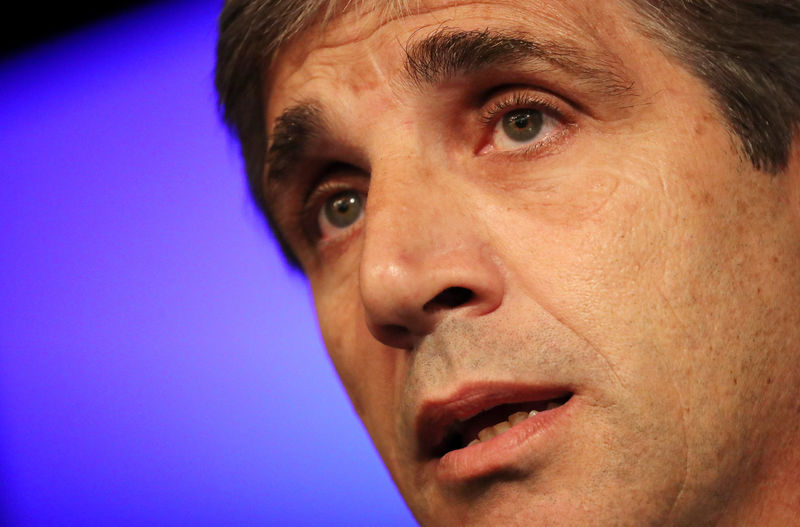Investing.com’s stocks of the week
By Jorge Otaola and Scott Squires
BUENOS AIRES (Reuters) - Argentina's central bank governor resigned on Tuesday in the midst of negotiations with the International Monetary Fund, dealing a blow to President Mauricio Macri's efforts to shore up investor confidence and sending the peso tumbling.
Luis Caputo's surprise resignation after just three months in the role came as a nationwide strike by unions, called to protest Macri's handling of the economy, shuttered public transit and ports across the country.
Former Economic Policy Secretary Guido Sandleris, who holds a doctorate in economics from Columbia University, was named as Caputo's replacement, a statement from the presidency said.
Argentina has been at the center of emerging market jitters in recent months. It has seen its peso currency lose more than 50 percent of its value so far this year amid concerns that a recession could impact the government's ability to pay its foreign debts.
Caputo, a former finance minister whose appointment three months ago was supposed to restore investors' faith in monetary policy, is the second Argentine central bank president to resign this year. A hike in central bank benchmark interest rates to 60 percent has failed to stem a slide in the peso.
The peso
"This resignation is due to personal reasons, with the conviction that a new agreement with the International Monetary Fund will reestablish confidence in the fiscal, financial, monetary and exchange rate situation," the central bank said in a statement.
Sandleris is a close ally of Economy Minister Nicolas Dujovne, who was at odds with Caputo in recent weeks over how to handle monetary policy during the crisis, according to Argentine media reports.
Sandleris did not immediately respond to a request for comment.
Argentina is in talks with the IMF to bolster a $50 billion standby financing agreement after a severe drought this year crippled the grain export sector and the run on the peso sparked fears the country would be unable to service its foreign debts in 2019.
An IMF spokesman said the organization looked forward to continuing its close relationship with the central bank under Sandleris' leadership.
Local media reported that a deal would be announced on Wednesday. However, foreign investors were jolted by Caputo's departure.
"The timing could not be worse for Argentina," said Paul Greer, Portfolio Manager, Fidelity Emerging Market Debt Fund. "Negotiations with the IMF about an expanded and revamped program have taken longer than expected, and Caputo's resignation will only add to investor uncertainty."
A government source told Reuters on Monday that a deal was likely in the coming days and could include some $3-5 billion in additional financing. Nomura said in a research note on Tuesday that investors had been hoping for an additional $10-$20 billion to allay concerns over debt servicing.
The Treasury Ministry estimated that Tuesday's strike could wipe out 31.6 billion pesos in lost output, or roughly 0.2 percent of gross domestic product.
